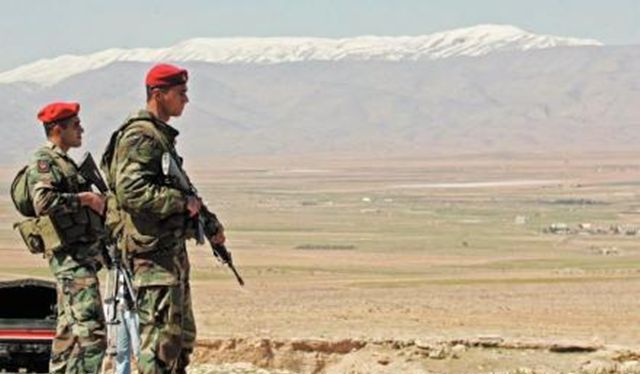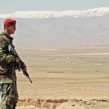
Is al-Qaeda Infiltrating Syria through Lebanon’s Beka’a Valley?
Publication: Terrorism Monitor Volume: 10 Issue: 1
By:

Disputes over the possible presence of al-Qaeda in Lebanon’s Beka’a Valley are beginning to destabilize Syrian-Lebanese relations. Attention on the Beka’a region has intensified following the December 23, 2011 and January 6, 2012 suicide bombing attacks in Damascus, which left a combined 60 dead and 229 wounded. On December 21, two days before the attacks in Damascus, Lebanese Defense Minister Fayez Ghosn told a meeting of Lebanese Army officers that the region of Arsal, in the northeastern Beka’a Valley, was being used for the smuggling of weapons and al-Qaeda members masquerading as Syrian dissidents into Lebanon (Al-Liwaa, December 21, 2011).
The Syrian government blamed members of al-Qaeda for the bombings, alleging some were seeking refuge and a base of operations in Lebanon by using the traditional human trafficking routes of the Beka’a Valley as a transit point from Syria into Lebanon. An already simmering dispute between Lebanon and Syria over the policing of contested areas of the Beka’a Valley, particularly in the northeastern frontier of Lebanon near the village of Arsal, has taken on new importance in determining the course of relations between the two countries since the Damascus bombings. Syria has mined its side of the border and conducts regular military helicopter patrols of the roads leading from Syria into Lebanon. Since May 2011, at least one resident of the Arsal municipal area has been killed and tens wounded by Syrian army operations on the Lebanese side of the border in the Arsal region. These operations have included armor and mounted infantry patrols (Daily Star [Beirut], January 4). The political conflict between the two countries over the Arsal region is severe enough that UN Secretary General Ban Ki Moon is expected to address the topic in depth on his January 13 visit to Lebanon (AFP, January 5).
Arsal, like its sister villages in the Arsal municipality, is located within a strip of disputed territory between Lebanon and Syria. Although the area is considered internationally part of Lebanon, the Syrian government still contests this claim. Arsal municipality is located in a region of semi-arid steppe land that depends largely upon animal husbandry, stone quarrying, and eco-tourism as its primary sources of revenue. Smuggling, most commonly in people, weapons, narcotics, and stolen goods, is part of the underground economy in the Arsal region, as it is throughout the Beka’a Valley. Located between the Beka’a Valley cities of Baalbek and Hermel, the area is approximately 20 miles from the Syrian border. Arsal has a population of almost 40,000 people, the majority of whom are Sunni Muslim and supporters of the Future Bloc (a member party of the anti-Syrian March 14 coalition), setting it apart politically from the rest of the Baalbek-Hermel region. Predominately Shi’a and associated with political parties that support the pro-Syrian March 8 coalition (including Hezbollah, AMAL, and the Lebanese Ba’ath Party), the area of Baalbek-Hermel is thought to be a stronghold of support for the Syrian regime. Ahmad Qanso, the most prominent political figure of the Lebanese Ba’ath Party has gone as far as to suggest that 20 al-Qaeda cells operate in Lebanon, and that public buildings in Arsal, including a mosque and a health clinic, are used by al-Qaeda to move fighters into Syria (al-Sharq al-Awsat, January 2).
Arsal’s reputation has not been improved by recent events. On November 21, 2011 the Lebanese Army briefly entered Arsal in order to follow- up on reports that a person tied to international terrorist groups might be present in the village, although no arrests were made in connection with the operation (Daily Star, December 29, 2011). The village is viewed by some as being a node in a smuggling network of weapons, drugs, and jihadists that includes the Beka’a village of Majdal Anjar, the Akkar district of northern Lebanon, and the purportedly militant Salafist neighborhoods in Tripoli. Majdal Anjar is another predominately Sunni Muslim, March 14 coalition-supporting village in the eastern Beka’a near the Lebanese-Syrian border. The link to Majdal Anjar is considered incriminating by some in Lebanon because the village is already notorious for having been a staging point and safe haven for militant Salafist fighters from Lebanon, especially from around Tripoli and the Akkar district, through Syria and into Iraq to confront the U.S. military there. Since the defeat of Fatah al-Islam fighters in Nahr al-Barid in 2007, Majdal Anjar is viewed as a likely place for confrontation between the Lebanese Army and militant Salafist fighters. Weapons smuggled in the region of Majdal Anjar are suspected of being used by Salafist fighters in “front-line” areas of Lebanon, such as the Tarek al-Jdeideh neighborhood in Beirut and between the Sunni Muslim Bab al-Tabbaneh and Alawite Jebel Mohsen neighborhoods in Tripoli. The village is also thought to be a source of Salafist fighters for these front-line districts, though not on the scale of the Tripoli neighborhoods of Qibbeh, Abu Samra, and Bab al-Tabbaneh and the village of Dinneyeh north of Tripoli. A Lebanese Army intelligence officer told the author that: “Majdal Anjar is the next Nahr al-Barid. It isn’t getting better there, it is worse.” [1]
Defense Minister Ghosn’s comments have led to a furious political debate in Lebanon, divided along the fault line that separates the pro-Syrian March 8 and anti-Syrian March 14 coalitions. Minister Ghosn is himself a member of the March 8 bloc (Daily Star, January 3, 2012). Representatives of the municipality of Arsal, including the mayor of the village, have categorically denied their involvement with al-Qaeda and demanded that the Lebanese Army increase its presence in their region (Central News Agency-Lebanon, December 27, 2011). Lebanese Prime Minister Najib Miqati, who is considered an ally of the March 8 coalition, stated that there was no clear evidence of al-Qaeda using Lebanon as a base to attack Syria (An-Nahar, December 28, 2011). Prompted by Ghosn’s statements to address the issue, Lebanese President Michel Suleiman insisted that the Lebanese people would not support al-Qaeda or any of the militant movements it has inspired, citing the popular support that the Lebanese Army received in 2007 as it confronted Fatah al-Islam militants in the Nahr al-Barid refugee camp north of Tripoli (Daily Star, December 28, 2011). In response to Ghosn’s comments, Lebanon’s Interior Minister Marwan Charbel stated that al-Qaeda does not have a military presence in Lebanon, only some ideological supporters (NBN TV, December 28, 2011). Members of former Prime Minister Saad Hariri’s Future Bloc went even further in denouncing Ghosn; in a public statement the party referred to Ghosn’s comments as “dangerous and suspicious,” implying that the Defense Minister could be working to support the al-Assad government (Daily Star, December 28, 2011). The largely Christian Lebanese Forces, also part of the March 14 coalition, have sent a delegation to Arsal to display solidarity with its people (Lebanese Broadcasting Corporation International, January 2). March 8 coalition member Suleiman Franjieh, a prominent pro-Syrian Maronite Catholic politician and leader of the Marada Movement, inflamed the debate by stating that the presence of al-Qaeda in Lebanon was being covered up by the Lebanese government (Daily Star, January 3).
In the context of ongoing Syrian military excursions into Lebanese territory around Arsal, and the Damascus bombings, Defense Minister Ghosn’s remarks have sparked a huge debate amongst Lebanese politicians and government officials on whether or not Lebanon, and this corner in the Beka’a Valley in particular, is being used as a staging ground for attacks into Syria. Minister Ghosn’s affiliation with the March 8 bloc has severely politicized the debate on the likelihood of al-Qaeda using Lebanon to attack Syria, reflecting the political divisions in Lebanese society and not the existential security threat that an al-Qaeda presence in Lebanon would pose both to the Lebanese state and to the Syrian government. Though harsh political rhetoric over the issue between the March 14 and March 8 Blocs in Lebanon is now the norm, there is no compelling evidence at present that al-Qaeda is using Arsal as an area of refuge or a staging point for attacks on the Syrian government.
Nicholas A. Heras is an M.A. Candidate in International Communication at the American University (DC) and a former David L. Boren Fellow.
Note:
1. The preceding section is based on informal interviews by the author of members of the Lebanese Army who were or are currently on duty in the Beka’a Valley. They were conducted by the author in Beirut, Lebanon from May 2011-August 2011 on the condition that the interviewees remained anonymous because they are still on active duty.





